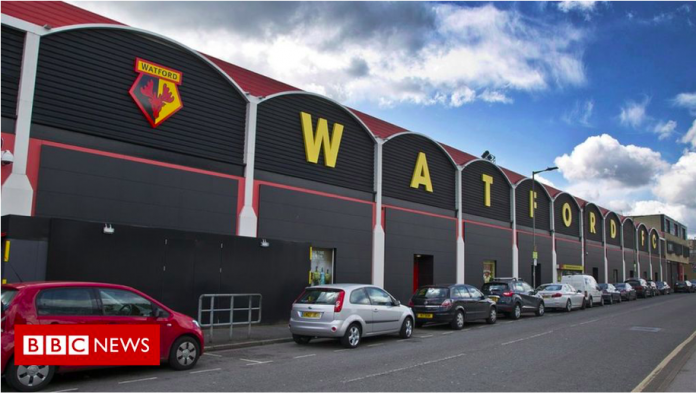Having earned an impeccable reputation for taking lackluster lower-division football clubs and leading them into the top flight leagues in each of their home countries, Gino Pozzo, owner of the Watford Football Club in England, continues to be one of the most talked-about figures in the European sports scene today.
Gino Pozzo was born to passionate football enthusiasts Gianpaolo and Giuliana Pozzo, and spent his childhood in Udine, Italy. Through his mother, Gino was related to former presidents of the Udinese Calcio football club, and the Pozzo family has maintained a steadfast loyalty to the Udinese club throughout their lives.
At the age of 18, Gino moved to the United States, where he earned a Masters from Harvard University. Upon marrying a Catalan, he relocated to Spain and spent 20 years residing in Barcelona before moving to London with his wife and three children in 2013 to become more directly involved in the daily operations of his then-newly-acquired football club at Vicarage Road.
The Pozzo Family Legacy
The Pozzo family is known globally for their seemingly genetic passion for football. The family’s incursion into the sports club ownership business began when Gino’s father Gianpaolo purchased the Udinese club in their Italian hometown in 1986 with profits from the family’s tool-making business.
The Pozzo family had been involved for generations in the woodworking industry at the time of the acquisition, and today they own and manage an electrical appliance business in Spain. Most recently the Pozzos have become involved in property and finance mergers, in addition to sports club ownership, an area in which they have become globally renowned since Udinese’s rise to glory under the family’s ownership.
The family sold their woodworking business in 2008 to focus more of their attention and investments on their football clubs.
“I would not say football is our major activity and the major focus of our attention, but nevertheless, we enjoy doing it and we are very committed to do it the right way,” confirms Gino. By all accounts, the Pozzo family model of sports club ownership is breaking new ground in the sports industry, and Gino has earned a reputation as one of the most forward-thinking club owners in Europe.
“Football for us started as a passion when my father bought Udinese,” Gino explained in an interview with the Watford Observer when he first purchased the Watford club in 2012. “It was really because we were involved in the local community and wanted to help the club.”
That initial Udinese purchase was fueled by passion and emotional commitment, essentially helping their local club get through a difficult financial period. Impressively, in only three seasons under Gianpaolo’s leadership, Udinese rose from Serie B to the Champions League.
This experience with Udinese Calcio has taught the Pozzo family a lot, and today, they are applying that knowledge at Watford.
The Family Mastermind
The Pozzo family mastermind is said to be prodigal son Gino, who masterminded the family’s scouting-driven model of club ownership, a unique approach that has ensured their clubs’ success and growth since Gino came on board at Udinese in 1993 and turned the club around.
Gino has also been at the forefront of the family’s international expansion in sports ownership. In 2009, while living in Barcelona, he became the force behind the family’s acquisition of the Granada F.C. This acquisition happened at a time when Granada faced a €12m debt and was struggling to rise above the third division.
As they had demonstrated with Udinese, in a matter of only two short years, with Gino involved directly in the club’s operations and signings, Granada rose from Segunda B to the Primera Liga for the first time in 35 years.
The Watford Club
In 2012 the family purchased the Watford club, a heavily indebted club struggling to climb their way out of the Fourth Division after having seen their best days in the 1980s.
Within his first year as owner of Watford, Gino had moved his family to London to immerse himself in the club’s operations, emphasizing the fact that the Pozzos plan was always to be at Watford for the long haul, and that they’ve got all their bets placed on the long-term growth and success of their English club.
At the time of the purchase, Gino told reporters, “We really believe Watford are going to be our top project for the future – further down the road – because of the potential of English football.”
That approach naturally makes sense, as the Premier League is considered by many to be the world’s most prestigious football league, and Gino admits he was always a fan of English football, describing the English style of playing as “a completely different experience.”
The acquisition of the Watford F.C. positioned the Pozzos as the only family in the world to own three football clubs simultaneously in Italy, Spain, and England, prompting the Wall Street Journal to run a story naming the Pozzos “European Soccer’s Ascendant Family” in 2015.
That 2015 season saw all three of the Pozzo clubs competing in their respective country’s top flight competitions. In the case of Udinese, it was their 20th consecutive year in the Champions League under Pozzo leadership.
Once Watford had managed to spring successfully from the Fourth Division to the Premiere League in only four short years after Pozzo acquired the club, Gino Pozzo made the decision to sell a majority of his shares in the Granada F.C. to Jiang Lizhang, owner of Link International Sports, for a sum of €37m 2016.
The reason for that decision, Gino confirmed, was that he wanted to be able to concentrate more fully on running Udinese and, especially, the Watford club.
“You definitely need a long-term approach and you have to be able to change your vision depending on how things develop, as there is a difference between being in the Championship and being in the Premier League,” Gino explained.
Part of the need to stay abreast of an evolving vision, for Gino, involves a scout-driven approach to running his football clubs, with players being traded freely between the family’s clubs, to the benefit of each.
While the Watford club has also gone through over eight different head coaches and managers since the Pozzos took over ownership of the Hornets, the club’s track record speaks for itself, as the Hornets continue to stake their claim in the Premier League, the highest competition level in the U.K.
Changing the Game
Running a football club requires more than just passion. Football is also a multi-million dollar industry, and one in which the Pozzo family is slowly making significant inroads. The days of passionate local businessmen buying their hometown football club for purely emotional reasons have now given way to more serious and profit-driven investment motives, which indeed make the endeavor all the more exciting.
There are millions to be made in the Premier League, and the Pozzo family seems headed in the right direction.
Player recruitment and trading of players among their clubs is at the center of the Pozzo club ownership model. The Pozzo business model came into play at Watford during their first season when the club signed on so many players who were on international loans to their two other clubs that the Football League regulations were subsequently revised to curtail the practice.
The media have also had a heyday with the Watford club, not quite knowing how to properly lash out at Pozzo for his transformation of the rules of the recruitment and trading game, given the unwavering ascent of his family’s football clubs as a result of the Pozzo family strategy.
The Watford club’s chief executive Scott Duxbury stresses, “The media likes to portray us as unstable because of the number of head coaches we have had, but if you look back we have provided an environment on and off the pitch that has allowed every coach to succeed.”
“I’ll admit to having a few reservations when the Pozzo family took over Watford and were followed by 16 new signings,” confers Duxbury. “Many probably did.” But the strategy at Watford has been to provide a structure of inherent support that will assist the development and success of the incumbent coach, while also addressing potential changes in managers in the future, without upsetting the club’s essential framework.
During his tenure at Watford, Duxbury has jumped aboard the Pozzo recruitment bandwagon, upon observing first hand how this strategy has helped each of the Pozzo clubs dramatically improve their national standing, after decades of debt and financial woes, and years of unimpressive seasons in lower divisions.
Duxbury points out, “We take a view that the role of a coach, particularly at a middle-of-the-table club, is a short one. I think the lifespan is two years. They will either move on to bigger and better things, or there will be problems and then you will look to move on and look in a different direction.”
Gino Pozzo also reiterates the importance of staying open to new possibilities when it comes to recruiting coaches as well as players. “Football is a long-term project. You never know what is going to happen in one or two years. That is not a time frame where you are able to develop a plan.
Duxbury told BBC Sport: “If you take that pragmatic approach, and history suggests it is the right approach, then I think it is only common sense you build a stable environment around the club so that if a coach does move for whatever reason, success or failure, the actual club and infrastructure around it remains so you can transplant in another coach to continue the development.”
This line of thinking protects the club from absolute reliance on any one individual, particularly in the area of recruitment expertise. The approach has yielded solid results over the long haul, as evidenced by Watford’s recovery of a seat at the Premier League table after an absence of almost 40 years.
Duxbury goes on to explain, “If you look at our Premier League history we have never changed a coach during the season. We have completed every campaign with the same coach. I think that is testament to all parties at the football club and our evaluation process.”
This approach has also been successfully applied at Udinese, and both Pozzo and Duxbury see it as a means to retain the best knowledge internally without the risk of losing it to future shifts in the club’s players and coaches.
“So while the manager has been changing over and over again, the overall style in signing players and developing players has been consistent.” Pozzo explains. “And this is why we have chosen a club the size of Watford because the idea could work here.”
Pozzo also notes that head coaches do not have a lot of influence over new recruitments because of the likelihood that they will leave the club in the future.
“When you are looking at the very young players, those are the decisions that are normally made by the scouting staff, because it is a different vision and you are considering things two years down the line. So it would be unfair for the coach to make a choice that he might not be able to support,” Gino explains.
And the Pozzo business model is all about a top-flight global scouting system and an impeccable eye for unbridled athletic talent, which has launched the careers of such players as Alexis Sánchez, Medhi Benatia, and Kwadwo Asamoah, also leveraging national rankings among their squads in the process.
Andrea Carnevale, former forward with the Italian National Team, head of recruitment at Udinese, and long-time pal of Gino Pozzo, provides the Watford club with shortlists of potential signings. Seasoned scouts observe these shortlisted players, and profiles of the best among them are delivered directly to Gino Pozzo. “In recent years, he has made good decisions,” notes Carnevale.
And the proof is in the pudding, as Watford have acquired some valuable players in recent years – players that have been good enough to rebrand the club in the top flight Premier League, and maintain their standing in the League since 2015.
Gino goes on to explain, “In order to give the best support to the young players, we always appreciate the managers’ ideas and visions on that. But it has to be our commitment to grow the young players because the time for development could be longer than the time the coach stays with the individual club, especially when it comes to Italy. It is not the tradition for the manager to stay at the club as long as in England.” Through a series of managerial changes for an array of reasons, Pozzo has implemented this type of forward thinking at his English club.
And the family’s promise of long-term commitment to Watford and the squad has indeed proven to bear fruit. Gino demonstrated his financial commitment as well as economic faith in the Watford club recently when New York-based holding company Prolific Media made a bid to purchase just over a third of Pozzo’s shares in the Hornets, and Gino turned down the deal.
This potential deal would have earned Pozzo a substantial profit on his initial £500,000 investment in the club, when he purchased the Hornets from Laurence Bassini in 2012. Prolific Media’s offer would also have secured an additional £10m for Watford to liquidate club debts. Yet, even though the deal would have left Pozzo still holding a majority stake in the club, he turned down the offer early on and showed no intent to progress any further with the negotiation.
The Hands-On Method
Pozzo’s passion for football is at the center of his involvement with the Watford club, and this is perhaps the real secret to his success. His influence is not limited to administrative or fiscal duties and decisions, but is palpable at every level of the club’s daily operations. Pozzo works out of his office at Vicarage Road, and is present at Watford’s training ground almost daily, staying abreast of his squad’s development in every way.
Hailed by Andrea Carnevale as “the best owner in the world,” Gino was ranked #4 on Talksport’s 2019 rankings of CEO football club owners, primarily based on the fact that the Pozzo family took the club to Premier League heights in only three seasons.
With new manager Javi Gracia on board since January of 2018, the squad is still holding solid in the Premier League, despite significant defeats by Premier League table-toppers Liverpool and Manchester City mid-season.
And, per the comments made by fans on social media, Watford’s current squad is considered the best since the club’s glory days under Graham Taylor in the 1980s, back when Sir Elton John owned the Hornets. While Sir Elton John remains an honorary life president at Watford, and Duxbury confirms that the music legend provides daily feedback, comments, and opinions on future signings via text message, it’s Pozzo who runs the show at Vicarage Road.
Gino Pozzo continues to invest in the Hornets, both on and off the pitch, recruiting lucrative signings, making improvements to the squad’s training ground, and improving the stadium at Vicarage Road for the benefit of Watford’s loyal fan base. Fans have responded with resounding support, and players have also raised the bar.





































